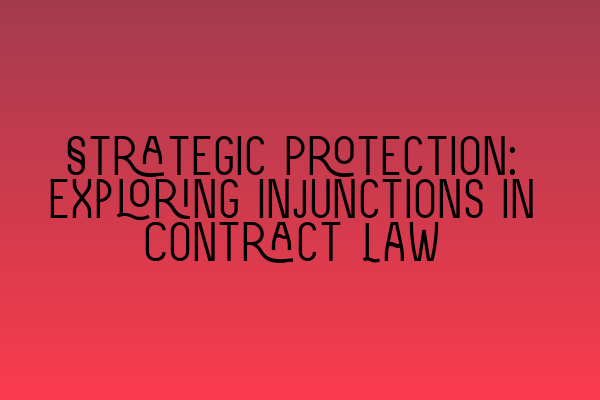Strategic Protection: Exploring Injunctions in Contract Law
When it comes to contract law, it’s crucial to have measures in place to protect your rights and interests. One such measure that provides strategic protection is the use of injunctions. In this article, we will delve into the concept of injunctions in contract law, exploring their purpose, types, and how they can be utilized to safeguard your contractual rights.
What is an Injunction?
An injunction is a court order that compels a party to do or refrain from doing a particular act. It is a powerful tool in contract law that aims to prevent harm or enforce a right. By seeking an injunction, you can secure immediate relief, preserve your position, and maintain the status quo until the final resolution of a contractual dispute.
Whether you are dealing with a breach of contract, misrepresentation, or any other contractual dispute, an injunction can provide the necessary protection while legal proceedings are ongoing.
Types of Injunctions
There are two main types of injunctions that can be sought in contract law:
- Prohibitory Injunction: This type of injunction restrains a party from engaging in a specific action that would cause harm or infringe upon your contractual rights. It aims to preserve the status quo and prevent any further damage.
- Mandatory Injunction: Unlike a prohibitory injunction, a mandatory injunction compels a party to take a specific action to rectify a situation or fulfill their contractual obligations. It is sought when mere restraint is inadequate to protect your rights.
When Can You Seek an Injunction?
A court will grant an injunction in contract law when certain conditions are met. These conditions include:
- Prima Facie Case: You must establish a strong case with evidence that supports the existence of a valid contract and a breach or potential harm.
- Irreparable Harm: You must demonstrate that damages alone would not adequately compensate for the harm suffered, making injunctive relief necessary to prevent irreparable harm.
- Balance of Convenience: The court will consider whether granting the injunction would cause greater harm to either party than not granting it.
It’s important to consult with a qualified solicitor who specializes in contract law before seeking an injunction. They will assess the circumstances and advise you on the likelihood of obtaining an injunction based on the specific facts of your case.
Benefits of Seeking an Injunction
Seeking an injunction in contract law can provide several benefits:
- Protection: An injunction safeguards your rights and prevents further harm or damage during the legal process.
- Evidence Preservation: By securing an injunction, you can ensure that evidence related to the contractual dispute is not destroyed or tampered with.
- Negotiation Leverage: A powerful injunction can enhance your negotiation position, leading to a favorable resolution without the need for protracted litigation.
Consult an Expert Solicitor for Strategic Protection
When it comes to contract law and seeking injunctions, it’s crucial to have an expert solicitor by your side. At SQE Contract Law, we specialize in contract law and can provide you with the professional guidance and representation you need.
Our team of experienced solicitors can assess your case, identify the most appropriate legal remedies, including seeking an injunction, and guide you through the entire process. With our expertise, you can strategically protect your rights and interests in contractual disputes.
To learn more about the legal services we offer or to discuss your specific case, contact us today. We are here to help you navigate the complexities of contract law and achieve the best possible outcome.
